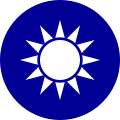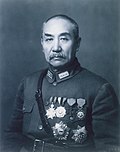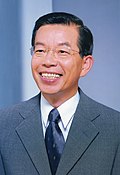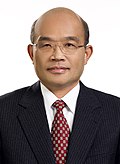| No. | Portrait | Name
(Birth–Death) | Term of office
Duration in years and days | Cabinet | Political party | Legislature
(elected) | President |
|---|
| (6) |  | Duan Qirui
段祺瑞
(1865–1936) | 29 June 1916 | 23 May 1917 | Duan I Reshuffled | Beiyang clique | 1st (1912) | | 
Li Yuanhong
(Progressive Party) |
|---|
| 328 days |
|---|
| — |  | Wu Tingfang
伍廷芳
(1842–1922)
acting | 23 May 1917 | 12 June 1917 | Wu T. Provisional | Independent |
|---|
| 20 days |
|---|
| — |  | Jiang Chaozong
江朝宗
(1861–1943)
acting | 12 June 1917 | 24 June 1917 | Jiang C. Provisional | Beiyang clique |
|---|
| 12 days |
|---|
| 7 | 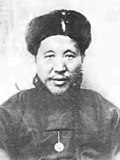 | Li Jingxi
李經羲
(1857–1925) | 25 June 1917 | 2 July 1917 | Li | Independent |
|---|
| 8 days |
|---|
| During this interval, Zhang Xun was the prime minister of the Restored Qing Imperial Government. |
| (6) |  | Duan Qirui
段祺瑞
(1865–1936) | 14 July 1917 | 22 November 1917 | Duan II | Anhui clique | | 
Feng Guozhang
(Zhili clique)
acting |
|---|
| 131 days |
|---|
| — |  | Wang Daxie
汪大燮
(1859–1929)
acting | 22 November 1917 | 30 November 1917 | Independent |
|---|
| 8 days |
|---|
| 8 |  | Wang Shizhen
王士珍
(1861–1930) | 30 November 1917 | 23 March 1918 | Wang S. | Zhili clique |
|---|
| 113 days |
|---|
| (6) |  | Duan Qirui
段祺瑞
(1865–1936) | 23 March 1918 | 10 October 1918 | Duan III | Anhui clique | 2nd (1918) |
|---|
| 201 days |
|---|
| — |  | Qian Nengxun
錢能訓
(1869–1924) | 10 October 1918 | 20 December 1918 | Qian Provisional | Independent | | 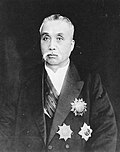
Xu Shichang
(Anhui clique) |
|---|
| 71 days |
|---|
| 9 | 20 December 1918 | 13 June 1919 | Qian |
|---|
| 175 days |
|---|
| — |  | Gong Xinzhan
龔心湛
(1871–1943)
acting | 13 June 1919 | 24 September 1919 | Gong Provisional | Independent |
|---|
| 103 days |
|---|
| — |  | Jin Yunpeng
靳雲鵬
(1877–1951) | 24 September 1919 | 5 November 1919 | Jin Provisional | Anhui clique |
|---|
| 42 days |
|---|
| 10 | 5 November 1919 | 14 May 1920 | Jin I |
|---|
| 191 days |
|---|
| — |  | Sa Zhenbing
薩鎮冰
(1859–1952)
acting | 2 July 1920 | 9 August 1920 | Sa Provisional | Independent |
|---|
| 38 days |
|---|
| (10) |  | Jin Yunpeng
靳雲鵬
(1877–1951) | 9 August 1920 | 14 May 1921 | Jin II | Anhui clique |
|---|
| 278 days |
|---|
| 14 May 1921 | 18 December 1921 | Jin III |
| 218 days |
|---|
| — | 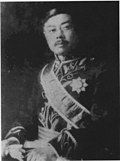 | Yan Huiqing
(W.W. Yan)
顏惠慶
(1877–1950)
acting | 18 December 1921 | 24 December 1921 | Yan H. Provisional | Independent |
|---|
| 6 days |
|---|
| 11 |  | Liang Shiyi
梁士詒
(1869–1933) | 24 December 1921 | 8 April 1922 | Liang | Communications Clique |
|---|
| 105 days |
|---|
| — |  | Zhou Ziqi
周自齊
(1869–1923)
acting | 8 April 1922 | 11 June 1922 | Zhou Provisional | Communications Clique |
|---|
| 65 days |
|---|
| 12 |  | Yan Huiqing
(W.W. Yan)
顏惠慶
(1877–1950)
| 12 June 1922 | 5 August 1922 | Yan H. I | Independent | | 
Li Yuanhong
(Research Clique) |
|---|
| 54 days |
|---|
| (1) |  | Tang Shaoyi
唐紹儀
(1862–1938) | 5 August 1922 | 19 September 1922 | Tang S. II | Independent |
|---|
| 45 days |
|---|
| 13 |  | Wang Chonghui
王寵惠
(1881–1958)
| 19 September 1922 | 29 November 1922 | Wang C. | Independent |
|---|
| 71 days |
|---|
| 14 |  | Wang Daxie
汪大燮
(1859–1929)
| 29 November 1922 | 11 December 1922 | Wang D. | Independent |
|---|
| 12 days |
|---|
| — |  | Wang Zhengting
王正廷
(1882–1961)
acting | 11 December 1922 | 4 January 1923 | Wang Z. Provisional | Independent |
|---|
| 24 days |
|---|
| 15 |  | Zhang Shaozeng
張紹曾
(1879–1928)
| 4 January 1923 | 13 June 1923 | Zhang | Independent |
|---|
| 160 days |
|---|
| — |  | Gao Lingwei
高凌霨
(1870–1940)
acting | 14 June 1923 | 12 October 1923 | Gao Acting | Zhili clique |
|---|
| 120 days |
|---|
| 12 October 1923 | 12 January 1924 | Gao Provisional | 1st (1912) | | 
Cao Kun
(Zhili clique) |
|---|
| 92 days |
|---|
| 16 |  | Sun Baoqi
孫寶琦
(1867–1931) | 12 January 1924 | 2 July 1924 | Sun B. | Independent |
|---|
| 172 days |
|---|
| — |  | V. S. Wellington Koo
顧維鈞
Gù Wéijūn
(1888–1985)
acting | 2 July 1924 | 14 September 1924 | Koo Provisional | Independent |
|---|
| 74 days |
|---|
| (12) |  | Yan Huiqing
(W.W. Yan)
顏惠慶
(1877–1950)
| 14 September 1924 | 31 October 1924 | Yan H. II | Independent |
|---|
| 47 days |
|---|
| — |  | Huang Fu
黃郛
(1880–1936)
acting | 31 October 1924 | 24 November 1924 | Huang Provisional | Political Science Clique | Premier as
acting President |
|---|
| 24 days |
|---|
| The premiership was abolished from 25 November 1924 to 26 December 1925. | | 
Duan Qirui
(Anhui clique) |
|---|
| 17 |  | Xu Shiying
許世英
(1873–1964) | 26 December 1925 | 4 March 1926 | Xu S.-Y. | Anhui clique | Dissolved |
|---|
| 68 days |
|---|
| 18 |  | Jia Deyao
賈德耀
(1880–1941) | 4 March 1926 | 20 April 1926 | Jia | Anhui clique |
|---|
| 47 days |
|---|
| — |  | Hu Weide
胡惟德
(1863–1933)
acting | 20 April 1926 | 13 May 1926 | Hu Provisional Acting | Zhili clique | Premier as
acting President |
|---|
| 23 days |
|---|
| — |  | Yan Huiqing
(W.W. Yan)
顏惠慶
(1877–1950)
acting | 13 May 1926 | 22 June 1926 | Yan H. Acting | Independent |
|---|
| 40 days |
|---|
| — |  | Du Xigui
杜錫珪
(1874–1933)
acting | 22 June 1926 | 1 October 1926 | Du Provisional Acting | Zhili clique |
|---|
| 101 days |
|---|
| — |  | V. S. Wellington Koo
顧維鈞
Gù Wéijūn
(1888–1985)
| 1 October 1926 | 11 January 1927 | Koo Provisional Acting | Independent |
|---|
| 102 days |
|---|
| 19 | 11 January 1927 | 16 June 1927 | Koo Acting |
|---|
| 156 days |
|---|
| 20 |  | Pan Fu
潘復
(1883–1936)
| 20 June 1927 | 3 June 1928 | Pan | Independent | | 
Zhang Zuolin
(Fengtian clique) |
|---|
| 349 days |
|---|
|
